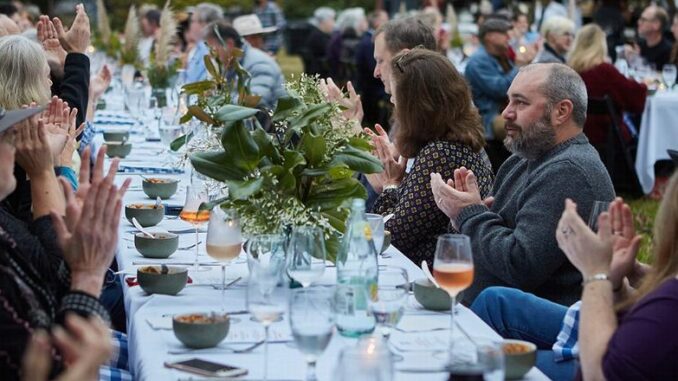
BRA, Italy, March 8, 2024 (ENS) – “Inspire Inclusion” is the theme of this year’s International Women’s Day. Celebrated annually on March 8, which this year falls on Friday, organizers are exploring the connection between nutritious, healthy food and the work of women in the growing, harvesting, cooking, and serving of that food.
“Food concerns us all. Yet the role of those who bring food to our tables, and especially the role of women within food systems, is often overlooked and underestimated,” Marta Messa, the Secretary General of Slow Food International, said.
“Slow food is the opposite of fast food,” Messa said.
“Across the world, women play a key role in food systems, often doing the heavy lifting, yet with limited decision-making power or land ownership rights,” she pointed out. “But inclusion means creating a society where everyone has the opportunity to fully participate and benefit, regardless of background, gender, or identity.”
“Women can accelerate the transition to sustainable food systems, all the more so within agroecological food systems that are rooted in gender equity, among other principles. The principles of agroecology provide a framework where diversity, equality and justice are tiles within a broader mosaic of sustainable food systems,” Messa explained.
Agroecology is sustainable farming that works with nature. It consists of healthy ecology, the relationships among plants, animals, people, and their environment, and the balance of these relationships, applied to agriculture.
Agroecology has benefits: mitigating climate change, managing the impact of farming on wildlife, and allowing local farmers to grow food in a way that suits their community.
In the state of Chiapas, Mexico, Adelaida Bolom Gomez is an indigenous Tseltal and Tsotsil woman from the Nueva Palestina Community. Involved in community activities her whole life, Gomez focuses on granting women access to land and creating a female-led agroecological garden.
“We promote food sovereignty and good nutrition to strengthen the identities and role of women in food production, including by preserving local seeds with agroecological practices,” Gomez relates. “We faced difficulties in convincing local groups to give us access to resources such as water and land, but now they understand the value of our work.”
Women Grow Food and Community Together
The Slow Food movement began more than 30 years ago in Rome with protests against the construction of a MacDonald’s near the city’s world-famous Spanish Steps. Today, it is a global movement, active in 160 countries, that works to preserve local food varieties and promote sustainable food systems.
The Slow Food movement amplifies voices from many communities around the world seeking to elevate the role of women in society, fight against prejudice and violence, and advance projects that can help make women free and independent.
In the central Asian country of Kyrgyzstan, biodiversity is threatened by human activities, which affect both ecosystems and communities. Small farmers in Kyrgyzstan, on about 400,000 family farms, produce about 98 percent of the country’s agricultural crops. The Slow Food International project includes activities to increase the capacity of farmers to grow clean and tasty products using agroecology.
The project includes training consumers and cooks on agrobiodiversity, waste reduction, climate adaptation, and increasing conscious consumption.
Aida Jamangulova from the Ala-Too Slow Food Community in Bishkek, the capital and largest city of Kyrgyzstan, is advancing agroecology in specialized schools. “The women of the Dyikan Muras network save seeds for future generations. It is mainly women who grow local vegetables to prepare nutritious and healthy food for their families or sell the surplus to the market. Recently they also started organizing local agroecological schools, where more experienced women farmers share their knowledge with younger generations.”
The nation of Sierra Leone, on the coast of West Africa, is in the midst of empowering women with the Slow Food Gardens project in the Kono District. Fatmata Mansaray, a local teacher and organic farmer, said, “On this Women’s Day, I want to emphasize that the Slow Food Gardens project has been a life-changing and resounding success in the fight for inclusion within our communities, giving us the possibility to engage with local authorities and open doors to educational opportunities that have been transformative for women’s inclusion and empowerment.”
“It stands as a testament to the power of collective action and the transformative potential of empowering women. Together, we are creating a more inclusive and equitable society for all,” Mansaray declared.
Slow Food Nourishes People in Many Countries
Across the Atlantic Ocean and across the long, slender tail of South America, Carolina Alvarado is a wine producer and coordinator of the Slow Wine Marga Marga community in Chile. Marga Marga province is one of the eight provinces in the central Chilean region of Valparaíso.
“Being a woman in our wine communities means playing a role that goes far beyond making wine,” Alvarado said. “It means generating and regenerating, it means nurturing, growing, holding strong bonds, as well as taking care of the land and production.”
“All this always following agroecological principles in total respect for Mother Earth. Our commitment now lies precisely in carrying out training and awareness-raising activities so that women have the knowledge to negotiate a fair price for their land and products, standing up to big industries and large landowners,” Alvarado explained. “During the fires that ravaged our biodiversity, we saw how strongly the women held the ties within the community, and with strength they are rebuilding.”
“Throughout Italy, there were once many mountain communities that based their economy on the chestnut tree, gathering around them women, men and children, each with their own role,” says Linda Orlandini, a producer in the Bolognese Apennines who is working to regenerate this ancient tradition. The goal is to revive, precisely from the chestnut, new opportunities for younger people, and to restore value to the central role that women played within communities.
Together with other chestnut farmers, Orlandini is part of the Italian Slow Food Chestnut Farmers Network, which for her “is a vehicle of knowledge. We rediscovered ourselves united by the same passion for this extraordinary and powerful tree and, today, we give each other confidence and courage.”
The United States has at least 80 Slow Food USA chapters across the country taking action to create food systems that work for their communities, including Washington, DC; Phoenix, Arizona; Seattle, Washington; San Diego, California; and Dallas, Texas.
Some chapters emphasize education. school garden programs or supporting farmers’ markets, while others focus on partnerships with community groups or advocating for good food policies.
The Slow Island Food & Beverage Co., based on the Hawaiian island of Kauai, “…was directly inspired by the ethos of the Slow Food movement and by the languid pace of living in our beautiful, bountiful island home,” says founder, chef and entrepreneur Gida Snyder. Creating pantry staples and specialty food products from Hawaii-grown ingredients, the Slow Island mission is to foster lasting relationships with farms and farmers while providing mentorship and education for aspiring young entrepreneurs from diverse backgrounds.
“Community wellness is a key value for Slow Island and we believe that our food security comes with ensuring the health and well-being of our farmers and farmland. We partner directly with our island farmers growing with sustainable and regenerative methods to source the ingredients for our line of sauces and syrups and condiments,” Snyder said. As a black female in the industry, Chef Snyder knows the impact it can make when young culinary professionals looking towards a career in food connect with a positive outlook. A longtime member of Slow Food, she belongs to Les Dames D’Escoffier International as well.
In Tunisia, on the south coast of the Mediterranean Sea, Nacyb Allouchi and Hayet Taboui, activists and coordinators of Rayhana, an association active in Tunisia, explain how they have opened the slow food door to all women.
Allouchi and Taboui are committed to developing a transformative movement for a new generation of free and conscious women, promoting a culture of common goods and environmental protection with the reduction of gender inequalities and promotion of socioeconomic opportunities for women.
Rayhana, with the support of the international SUSTAvianFEED project, empowers women through education and skills development. They offer tailored training programs that equip women with the knowledge and tools they need to excel in sustainable agriculture, from organic farming to sustainable land management practices.
Local communities can benefit from agroecology’s promotion of agrobiodiversity and resilient ecosystems, which can lead to food security and economic stability, making it easier to face environmental challenges such as the climate crisis.
Now turning to Serbia, we meet Dragana Velovic, the Slow Food Gledic local coordinator in the country, who says, “In order to influence a change in consciousness and to empower women living in the Gledić Mountains area, a mountain range in central Serbia, between cities of Kragujevac, Jagodina and Trstenik, we organized several workshops for them and for school children, especially addressing topics such as domestic violence and their rights.”
“Too often women have on their shoulders housework, childcare and work in the fields, but without any recognition of freedom, neither personal nor economic,” Velovic recognized. “We are here to try to change this.”
Featured image: Slow Food banquet at the Mahaffey Farmhouse, Princeton, Louisiana, October 22, 2023 (Photo courtesy Slow Food North Louisiana)
© 2024, Environment News Service. All rights reserved. Content may be quoted only with proper attribution and a direct link to the original article. Full reproduction is prohibited.



